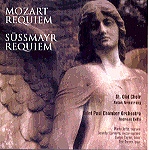Any recording by the St. Olaf Choir is worth attention, and although the catalog is hardly desperate for another Mozart Requiem, this program offers an intriguing coupling–what purports to be the modern “premiere” of Franz Süssmayr’s own Requiem, likely written sometime after his celebrated (and sometimes maligned) effort to complete Mozart’s beloved yet unfinished setting. There’s absolutely nothing wrong with the singing here–you can count on this choir to be fully prepared for whatever it undertakes, and Anton Armstrong is America’s pre-eminent choral conductor. If you’ve had the good fortune to hear one of the choir’s concerts, you know how good choral singing can be, and you know the glory of inspired, focused ensemble performance. Ironically, it’s the quality of the live concert recording, and the strikingly contrasting ambience from two different venues, that compromises the otherwise superb work by the performers, including a very fine group of vocal soloists and a solid, reponsive orchestra.
For the Mozart, the sound is acceptable in that you can make out most of the detail in the choral parts, and the solos and quartets are well-balanced; but the orchestra often sounds as if it’s mixed in with the singers, so in the tuttis you have trouble separating choir from instruments, either spatially or texturally–undoubtedly a function of concert conditions, but nevertheless a definite concern for CD listeners. Interpretively, there’s no lack of energy or attention to the text, and, some idiosyncratic Latin pronunciation aside (“ekselsees”, for example), this is as satisfying and reliable a performance as the best in the catalog.
The Süssmayr Requiem is one of those works whose obscurity is pretty much deserved–there’s absolutely nothing special or original or compelling about it, and yet it retains significant value for its clues to the composer’s own style and, most importantly, to his methods and compositional solutions to matters of text setting, orchestration, harmonization, and fundamental aspects of choral/orchestral structure. The one thing that looms large after listening for a few minutes: how could this composer be the same one who completed Mozart’s work? There are a few moments of cleverness and even high competence–but you have to conclude that in finishing Mozart’s Requiem he must have had some serious help, most likely in the form of sketches that he either destroyed or were accidentally lost. The sonic cast for this part of the CD is more resonant than for the Mozart, and the performers are closer, yielding a somewhat strained quality to the strings–and worse, making them seem out of tune at times (directly attributable to faulty miking, not the playing). Again, the singing is superb, giving Süssmayr’s Requiem as committed and highly polished a performance as we could ask for–and perhaps better than it has a right to expect!
The uncredited writer of the liner notes shares my view that while we may wish for–and modern scholarship urges–some “improvement” on Süssmayr’s flawed completion of the unfinished work of a genius, nevertheless, it’s really the best we have, and it bears an authenticity–after all, Süssmayr was at Mozart’s side during his last days–that no modern author, no matter how well-intentioned or how musicologically well-armed can claim. I have to mention, however, that this recording suffers from several bad production decisions: the basic track listings appear only on the back of the jewel-box–nothing in the liner booklet (an irritating and unnecessary inconvenience); intrusive audience noise is inexplicably left in at several points in between tracks–and similarly, loud audience applause and shouts are included at the end of the CD. No one really wants to hear this and why anyone thinks so is beyond me. And for those really paying attention, there’s a rough electronic glitch about 45 seconds into the “Confutatis” movement. Finally, for some reason Mozart’s work is listed only as “Requiem”, without the usual key and catalog designation, Requiem in D minor K. 626–not a big deal, but another curious and unnecessary omission. This will be a definite acquisition for St. Olaf fans, but if you have a favorite Mozart Requiem, you need not worry about this one, well sung as it is. However, if you’re curious about Süssmayr, this is one of the few opportunities to indulge your interest.
































